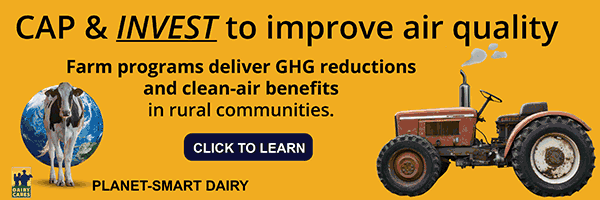
CAP & INVEST
As California policymakers reauthorize the Cap-and-Trade Program, a focus on investment is critical to maximize climate ROI. Key agricultural programs funded under California Climate Investments continue to return "bang for buck" in both greenhouse gas reductions and significant air quality benefits.

Key incentives such as FARMER, dairy methane reduction programs, and the Food Production Investment Programs (FPIP) have been critical in assisting the agricultural sector transition to the cleanest technologies.
Although considerable progress has been made, additional emission reductions are needed to meet statewide GHG, methane, and air quality goals, especially in light of challenges with the state's transportation strategy. Prioritizing agricultural investments to continue the turnover of older agricultural equipment, continue developing dairy methane avoidance projects and investment in sustainable food production technologies will be critical to meeting our state's clean air and climate goals.
Agricultural investment programs are highly over-subscribed. Total funding needed for the highly cost-effective programs currently exceeds $1 billion, in order to achieve necessary emission reductions and provide clean air benefits.
LEARN MORE
The California Department of Food and Agriculture (CDFA) Livestock Methane Reduction programs are among the state’s most effective and cost-efficient climate investments. More than 300 methane reduction projects have been funded on dairies in the state, reducing more than 3 million metric tons of CO2e annually. These projects also provide tremendous air quality benefits for rural and disadvantaged communities as diesel trucks are being fueled with clean, renewable natural gas.
FPIP, managed by the California Energy Commission (CEC), provides grants to food processors to accelerate adoption of advanced energy and decarbonization technologies. Sixty FPIP projects to date will result in a reduction of 3.2 million metric tons of CO2e over their useful lifetimes.
The FARMER program has a proven track record, with oversight from the Air Resources Board and implementation through local Air Districts, replacing older diesel tractors and equipment with cleaner alternatives. The program delivers immediate air quality and public health benefits, reducing over 28,000 tons of NOx, 1,600 tons of PM and 388,000 metric tons of CO2e emissions annually, while prioritizing disproportionately impacted areas.
Livestock Methane Reduction Programs
Food Production Investment Program (FPIP)
Funding Agricultural Replacement Measures for Emission Reductions (FARMER) Program
